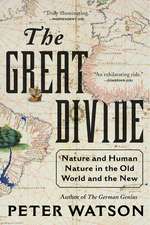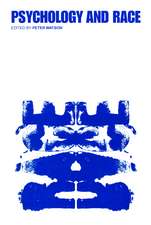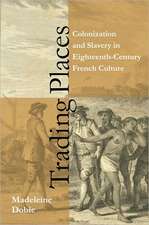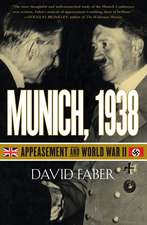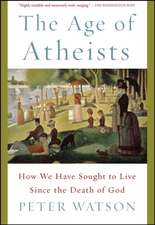The German Genius: Europe's Third Renaissance, the Second Scientific Revolution and the Twentieth Century
Autor Peter Watsonen Limba Engleză Paperback – 3 aug 2011
Yet how did the Germans achieve their pre-eminence beginning in the mid-18th century? In this fascinating cultural history, Peter Watson goes back through time to explore the origins of the German genius, how it flourished and shaped our lives, and, most importantly, to reveal how it continues to shape our world. As he convincingly demonstarates, while we may hold other European cultures in higher esteem, it was German thinking-from Bach to Nietzsche to Freud-that actually shaped modern America and Britain in ways that resonate today.
Preț: 81.04 lei
Nou
Puncte Express: 122
Preț estimativ în valută:
15.51€ • 16.19$ • 12.83£
15.51€ • 16.19$ • 12.83£
Carte disponibilă
Livrare economică 14-28 martie
Livrare express 28 februarie-06 martie pentru 38.45 lei
Preluare comenzi: 021 569.72.76
Specificații
ISBN-13: 9781416526155
ISBN-10: 1416526153
Pagini: 992
Ilustrații: 16pp b-w plates
Dimensiuni: 129 x 198 x 58 mm
Greutate: 0.69 kg
Editura: Simon & Schuster
Colecția Simon & Schuster UK
ISBN-10: 1416526153
Pagini: 992
Ilustrații: 16pp b-w plates
Dimensiuni: 129 x 198 x 58 mm
Greutate: 0.69 kg
Editura: Simon & Schuster
Colecția Simon & Schuster UK
Notă biografică
Peter Watson was born in 1943 and was educated at universities in Durham, London and Rome. He has been on the staff of the Sunday Times and The Times, and has written for many other newspapers. He is the author of over a dozen books including Ideas: A History from Fire to Freud. He lives in London.
Descriere
From the end of the Baroque age and the death of Bach in 1750 to the rise of Hitler in 1933, Germany was transformed from a poor relation among western nations into a dominant intellectual and cultural force more influential than France, Britain, Italy, Holland, and the United States. In the early decades of the 20th century, German artists, writers, philosophers, scientists, and engineers were leading their freshly-unified country to new and undreamed of heights, and by 1933, they had won more Nobel prizes than anyone else and more than the British and Americans combined. But this genius was cut down in its prime with the rise and subsequent fall of Adolf Hitler and his fascist Third Reich-a legacy of evil that has overshadowed the nation's contributions ever since.

